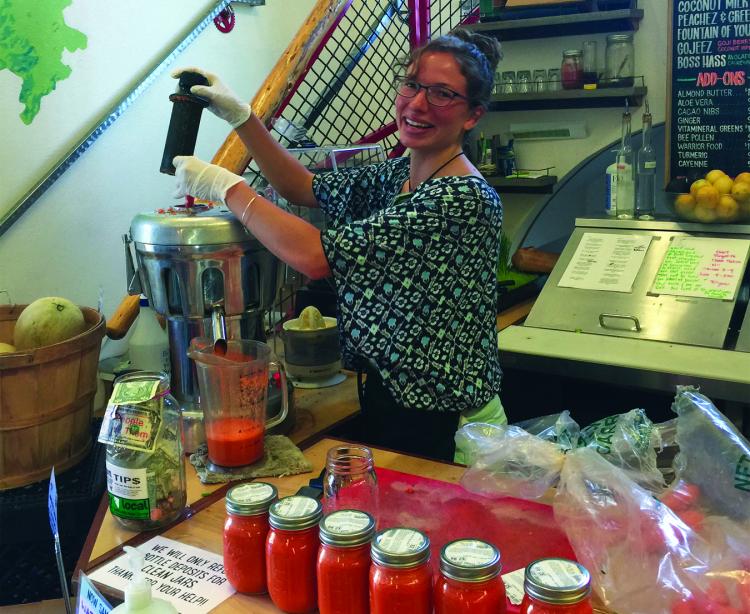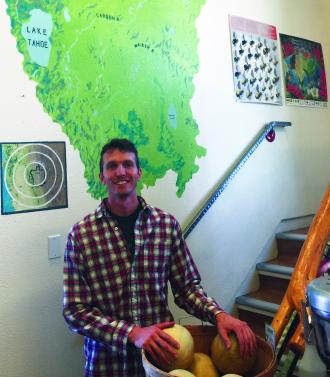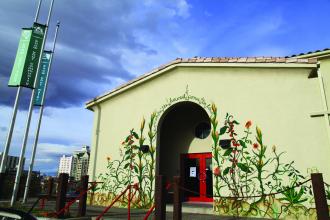A Visit to Reno's Great Basin Community Food Co-op



During the past month, I had the chance to visit Great Basin Community Food Co-op in Reno, Nevada. Heading into the Yosemite and the Mono Lake area for a few precious days of long-planned family hiking, my “first-things-first” instinct was to visit the nearest food co-op. We needed vegetables, protein, and local berries.
There’s something so exciting about visiting a co-op you’ve never seen before, right? And it’s thrilling to make contact with others working to create these warm and welcoming stores.
Begun in 2005, Great Basin opened its current location in 2012. Nestled in the heart of Reno, it stands in contrast to the banks and other mid-sized high-rises down the street. Easy to access, it’s a unique stucco building surrounded by garden landscaping. Sunflowers wave in the cool elevated air, green tomatoes ripen on the vine. The smell of fresh herbs is bracing.
When we arrived, a number of customers were socializing on the patio around large wooden tables, eating lunches from the in-house co-op kitchen. Paintings on the outdoor walls emphasize the store’s connection to the earth. “Everyone welcome” is written over the front door. Inside, there’s a beautiful produce section and a fresh-juice bar.
I spoke with Operations Manager Andrew Yochum, who told me that Great Basin is one of the fastest growing food co-ops in the nation. Sales are again up this year (24 percent to date), with sustained and impressive growth powering the co-op throughout its history. The staff includes 26 core players.
An upper level holds a vibrant wellness section, office space, and a currently under-renovation community room. The place was buzzing and soul-sustaining.
Playing the local ground game
The history of the relatively young Great Basin Community Food Co-op (GBCFC) echoes that of many food co-op startups today. It began as a buyers’ club, with the goal of increasing community access to affordable, sustainable, and wholesome food.
Initially associated with a cooperative local food program known as the Great Basin Basket, GBCFC continues to be deeply connected with its local foodshed through its DROPP program: Distributors of Regional and Organic Produce and Products.
Two sisters, Amber and Nicole Sallaberry, were founders and first champions of the store. Amber continues as general manager, and Nicole serves as the sustainability and local food coordinator (including the DROPP program), helping build the northern Nevada infrastructure for local, organic, and non-GMO food.
The DROPP program includes a website where farmers, rangers, and producers offer local products for sale, to be delivered to GBCFC. Customers are able to place orders online, and it’s easy for producers to become affiliated with the co-op. DROPP bulk orders are advertised on bi-weekly sales flyers, along with in-store specials such as Field Day products and clearly labeled deals from the co-op’s kitchen.
Co-ops are an eco-system
My visit to Great Basin underscored a thought I’ve held recently—that co-ops are part of a larger eco-system that includes valuable interactive “store organisms” of various sizes. The more we understand that, the easier it will be for us to remain flexible and competitive, forging the new connections and finding the strategies we need to survive, thrive, educate, and serve our shoppers.
An ecosystem point of view allows us to continually test and reshape our current boundaries. It demands that we think about both our local foodshed and our national (let’s face it: our international) food system. It underscores the value of getting out and tramping around a bit, getting our feet dirty.
As locavores, we are exploratory. We become familiar with the terrain wherever we happen to be walking. At the same time, our food co-op ecosystem connects us with people holding similar values all over the world.
Like all businesses today, we face new competitive challenges. Some of them have evolved because the big ideas we represent have taken root in the broader culture. Shoppers want healthier food, and communities are embracing more sustainable options. There is more awareness of the co-op business model, and more criticism of big ag and of large corporations. Many aspects of our culture are in transformation.
Yes, it’s disruptive. And the solutions we find won’t take just one shape. They reflect global, national, and local realities. In some places, our best stores are the small or mid-sized ones, where we clearly offer more local connections than you’ll find in the large chains, with their private-label “mystery” food.
The premise of Cooperative Grocer Network is that all of our food co-op efforts—those that are experimental, those that need improvement, and those that are resounding successes—have significance. We learn from one another.
That juice bar—oh, my!
By the time we left Great Basin, we’d loaded our cart with the food needed for a week of vacation. Our cashier told us what brought her from the Netherlands to Nevada (love!), and we picked up a returnable Mason jar filled with fresh carrot juice.
Said one of the juicemasters, Isabella Jacobs, “It’s something customers wanted, and the staff loves it, too.” Another benefit of the fresh juice and smoothie bar? Waste in the produce section is now virtually nonexistent.
Visit their beautiful website to learn more about Reno’s Great Basin Community Food Co-op, including their strategies for improving access to local goods produced within the watershed of the Truckee, Carson, and Walker Rivers: https://www.greatbasinfood.coop. ♦
Our ecosystem is big—and our stores are all sizes
The chief initiative of Cooperative Grocer Network (CGN) is to inspire all of us to our best work, becoming the best grocers and community members we can be. Knowing our history and viewing the food co-op ecosystem helps us position—and evaluate—ourselves in specific and meaningful ways.
We issued CGN membership invoices in July, and the response has been heartening. In doing so, we moved our billing system to a new timeframe, corresponding with the fiscal year. Membership is no longer matched to the calendar year, but will run from July 1 to June 30.
We’ve reduced our pricing into four basic categories, corresponding to the sizes of our stores:
SEED: Startups take us right back to our core values, to the desire for community involvement that is the principled heartbeat of our stores. It’s important that startups have access to CGN. We offer subscriptions to them for $200 per year.
SAPLING: Small and growing is beautiful. Those first doors on the store open to everyone, reshaping the way our customers shop and think about food access. Base membership dues begin at $400 per year.
BROADLEAF: Sturdy and tall, these stores have deep roots. They pull us into the comfort of their shade. CGN variable subscription pricing is calculated at $70 per million in annual sales.
EVERGREEN: These are the big stores, the ones that wow us with their sustained success and the size of their footprint. They have an enormous impact. CGN subscriptions cap off at $1,400 per year for large and multi-store operations.
CGN is more than a magazine and a community platform. Metaphorically, it’s a forest of great trees (large and small), a place to explore our core values and operational wisdom. It is designed to help us establish channels between our regions. Together, we repurpose the past, manage the present, and co-design the future. Thank you for your support for CGN.







